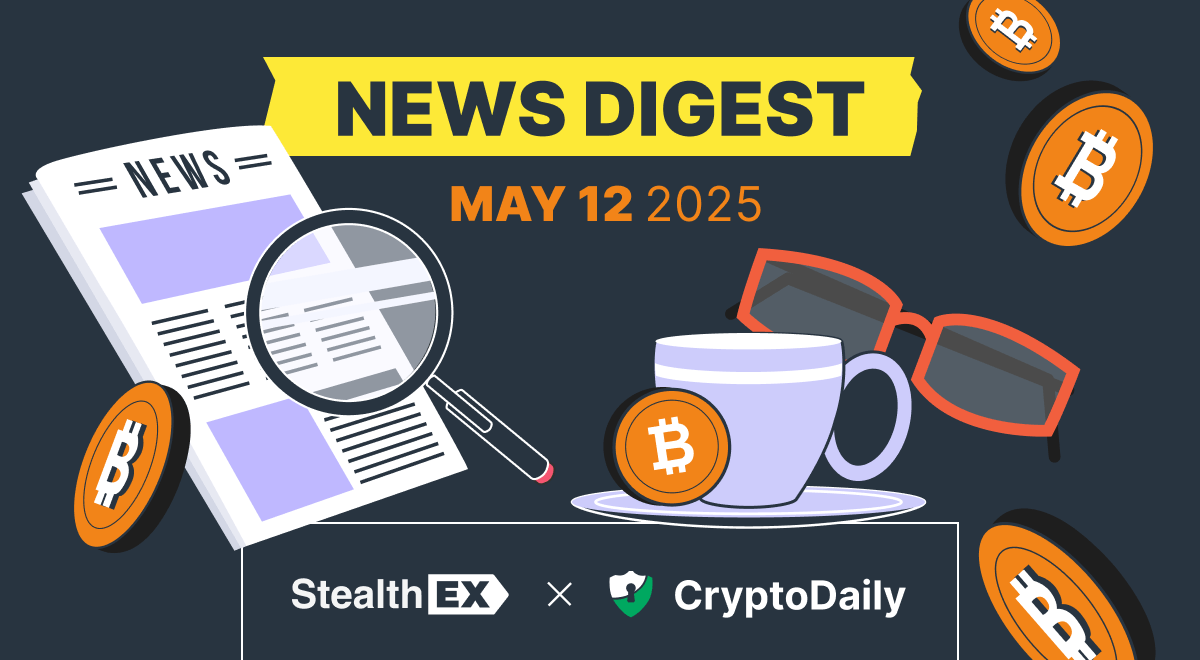Ethereum Pectra Upgrade, Meta Explores Stablecoins & Bhutan Crypto Tourism

StealthEX and CryptoDaily are back with your weekly dose of crypto updates. A lot is happening, and you don’t want to miss it. We’ve rounded up the biggest news, cut out the noise, and made it easy to understand. Clear, simple, and straight to the point — just how crypto news should be. Whether you’re trading daily or just getting started, this quick recap keeps you updated. So, let’s jump in.

Article contents
- 1 Bhutan Turns to Crypto to Power Tourist Payments
- 2 Ethereum Boosts Speed and Flexibility With Pectra Update
- 3 Meta Reconsiders Crypto With Stablecoin Payment Push
- 4 Ex-Celsius CEO Gets 12 Years in Prison for Crypto Fraud
- 5 Bitwise and 21Shares Turn to Altcoins With New Investment Products
- 6 Japan’s Metaplanet Buys 555 More Bitcoin
- 7 Ripple Donates $25M in Stablecoin to U.S. Classrooms
- 8 KuCoin and Patrice Evra Team Up to Power Global Kindness With Crypto
- 9 BlackRock Talks Crypto Rules With SEC Amid ETF Push
- 10 Arizona Creates State Bitcoin Reserve With Unclaimed Funds
- 11 SEC Delays Decision on Litecoin ETF, Seeks Public Input
Bhutan Turns to Crypto to Power Tourist Payments
Bhutan is making it easier for tourists to spend crypto. Thanks to a new system backed by Binance Pay and DK Bank, visitors can now use digital assets to pay for almost everything during their trip. Hotel rooms, flights, entry to monuments, and even roadside snacks can be paid with over 100 cryptocurrencies, including Bitcoin, USDC, and BNB.
The move is the first of its kind. Bhutan is the only country with a national crypto tourism payment system. Using the Binance app, tourists simply scan QR codes and pay instantly. All payments are settled directly in Bhutan’s local currency, making it smooth for both visitors and local businesses.
The small Himalayan kingdom has big plans for crypto. With around 30% of its economy tied to Bitcoin mining, Bhutan sees digital assets as a long-term economic solution. Years of declining tourism and the impact of COVID-19 pushed the country to seek new ideas. This new system helps small vendors and rural communities join the tourism market.
More than 100 local businesses have already signed up. The partnership offers a real boost to financial access. DK Bank, the country’s first digital bank, is at the core of the system, providing simple, fast, and secure services for all.
Ethereum Boosts Speed and Flexibility With Pectra Update
Ethereum just made its biggest upgrade in over a year. Called Pectra, the update rolled out on May 7 and is designed to make the network faster, more scalable, and easier to use. It only took 13 minutes to activate, but the impact is huge.
One major change is the staking limit. Before, users could only stake up to 32 ETH per validator. Now, they can stake up to 2048 ETH. This helps big players and simplifies operations. Validators also benefit from faster processing—what used to take 12 hours now takes just minutes.
Pectra brings new tools too. A feature called EIP-7702 allows regular wallets to act like smart accounts. That means users can pay fees with stablecoins, set up automatic payments, and recover accounts more easily.
Ethereum also improved how it handles data. The number of blobs per block increased from six to nine. This makes Layer 2 networks, like Arbitrum, cheaper and faster. Rollup fees could drop by up to 90%, even when the network is busy.
This upgrade prepares Ethereum for what’s next. Developers are already planning future steps, but Pectra shows Ethereum’s serious push toward being faster, more efficient, and user-friendly.
Choose StealthEX for Exchange and Buy Crypto.
- User-Friendly — Simple and minimalistic interface for everyone.
- Fast and Private — Instant non-custodial cryptocurrency exchanges.
- Buy crypto with Credit Card.
- 1500+ coins and tokens are available for limitless, quick and easy exchanges.
- NO-KYC crypto exchanges — Buy cryptocurrency up to $700 without KYC!
- StealthEX crypto exchange app — Process crypto swaps at the best rates wherever you are.
- 24/7 Customer Support.
Earn from Each Exchange by Joining StealthEX Affiliate Program.
Become a partner right now and use affiliate tools:
- Public API — Earn from your wallet, aggregator, or exchange terminal.
- Referral Links — Recommend StealthEX to your audience.
- Exchange Widget — Built crypto exchange widget on any page of your website.
- Button — A perfect choice for traffic monetization.
- Banner — Track conversion and stats right in the personal cabinet.
Meta Reconsiders Crypto With Stablecoin Payment Push
Meta is taking another look at crypto. After dropping its Diem project years ago, the tech giant now seems ready to try again—but with a different plan. According to insiders, Meta is exploring ways to use stablecoins for payments across platforms like Instagram and Facebook.
The company is not creating its own coin this time. Instead, it’s talking to outside crypto firms about using existing stablecoins. Meta is looking at options like USDC and others, but hasn’t made a final decision. The focus is on smooth, low-cost transactions, especially for creators and users sending money across borders.
Leading the effort is Ginger Baker, Meta’s new VP of Product. She joined in January and has a strong background in fintech. Under her guidance, Meta is moving carefully. The company wants to avoid past mistakes while testing what works.
Interest in stablecoins is growing everywhere. Stripe just bought a stablecoin startup for over $1 billion. US lawmakers are also working on clearer rules. Meta sees this as a chance to rejoin the conversation—but without rushing.
CEO Mark Zuckerberg recently admitted the Diem project failed. But he also said Meta is still open to bold ideas. Stablecoins might just be the safer path forward.
Ex-Celsius CEO Gets 12 Years in Prison for Crypto Fraud
Alex Mashinsky is heading to prison. The former boss of Celsius was sentenced to 12 years after admitting to fraud. He misled users about the company’s health and made millions while investors lost billions.
A judge in New York delivered the verdict. Prosecutors had asked for a 20-year term. They argued Mashinsky lied on purpose and personally took over $48 million. He had promised safety and high returns, but Celsius collapsed during the 2022 crypto crash.
Mashinsky’s lawyers tried to paint a different picture. They said he didn’t act with bad intentions and reminded the court of his past as a war veteran and successful entrepreneur. Still, the judge ruled that his crimes were too serious to ignore.
Celsius once claimed to be a better option than banks. It attracted users with promises of high yields on crypto deposits. But when markets crashed, the business couldn’t keep up. It froze withdrawals and filed for bankruptcy, leaving customers stranded.
Mashinsky’s sentencing is one of the harshest in crypto history. It sends a clear signal to others in the industry. With more legal cases underway, the fallout from past crypto failures is far from over.
Two major crypto investment firms are looking beyond Bitcoin and Ethereum. Bitwise and 21Shares are now pushing into altcoins, showing a shift in where big money sees potential.
21Shares just launched a new product in Europe. It offers exposure to Cronos (CRO), the token that powers Crypto.com’s blockchain. The ETP began trading on May 6 in Paris and Amsterdam. This gives European investors a way to access CRO through a regulated exchange, which wasn’t possible before.
Meanwhile, Bitwise has filed paperwork in the U.S. for a new ETF tied to NEAR, a fast-growing layer-1 blockchain. If approved, the fund will track the market price of NEAR and hold its tokens in custody with Coinbase. The filing is still early, and key details like the ticker and fees are not public yet.
These moves reflect growing interest in platform tokens beyond the top two. Bitwise already has products tied to Bitcoin and Ethereum. Now, it’s expanding into projects like Dogecoin, XRP, and Solana.
But approval is not guaranteed. The SEC continues to delay decisions on altcoin ETFs. Despite this, firms like Bitwise and 21Shares are clearly preparing for what they believe is the next phase in crypto investing.
Japan’s Metaplanet Buys 555 More Bitcoin
Japanese firm Metaplanet is going all-in on Bitcoin. The company just bought 555 BTC for about $53.4 million, bringing its total holdings to 5,555 coins. That makes it the biggest public Bitcoin holder in Asia.
This latest buy was funded using zero-coupon bonds. These are loans with no interest, issued to EVO FUND. They mature in November 2025. By using this method, Metaplanet keeps costs low while growing its Bitcoin stack.
The company paid around $96,134 per Bitcoin in the latest deal. Across all its purchases, the average price comes to about $86,672 per coin. The return so far in 2025 is over 130%, showing strong results from its Bitcoin-first approach.
Investors are impressed. After the news, Metaplanet’s stock jumped over 13% in one day. Shares closed at ¥485, with the company now worth over ¥24 billion. The company plans to keep buying, aiming for 10,000 BTC by the end of 2026.
Metaplanet also announced plans for a U.S. branch in Miami. The move strengthens its position in the global Bitcoin market. It’s a clear sign that Metaplanet sees Bitcoin as more than just an investment—it’s the heart of its long-term strategy.
Ripple Donates $25M in Stablecoin to U.S. Classrooms
Ripple is using its stablecoin for something new—helping schools. The company just donated $25 million in RLUSD, its U.S. dollar-backed token, to support American teachers and students.
The donation was announced during Teacher Appreciation Week. Ripple partnered with DonorsChoose and Teach For America to deliver classroom supplies, expand STEM programs, and offer tutoring and teacher training.
Most of the funds will be given in Ripple’s stablecoin. This marks the first time a large nonprofit education campaign has accepted crypto at such a scale. The move also brings stablecoin payments into the world of philanthropy.
According to a recent survey, more than half of U.S. parents are unhappy with school resources. Ripple wants to help fill those gaps using fast, reliable digital payments. The crypto industry sees this as a major step in showing how blockchain can support real-world causes.
Ripple’s CEO said the company is focused on financial access and education. The donation is part of a larger goal to use crypto for good. The firm is encouraging others to join in, allowing donations in RLUSD, XRP, and other digital assets through The Giving Block.
KuCoin and Patrice Evra Team Up to Power Global Kindness With Crypto
Crypto meets kindness in a new partnership between KuCoin Pay and WLTG, a platform founded by football legend Patrice Evra. Together, they aim to mix blockchain, AI, and community to drive a global movement called “Pay It Forward.”
At the heart of WLTG is AI Patman, a digital version of Evra. Fans can interact with it through messages, football predictions, and special offers. With KuCoin Pay now integrated, fans can use crypto to support campaigns and unlock rewards—no banks or cards needed.
The goal is to make doing good easy. Whether it’s joining a fan challenge or donating to a cause, users can now act with a few taps using digital coins. It’s all part of a bigger plan to bring purpose to blockchain.
KuCoin’s CEO says crypto should be about more than money—it should build trust. Patrice Evra agrees, adding that this partnership brings people together through technology and shared values.
The platform will also launch new tools that mix AI and payments. Fans will be able to co-create content and send value across borders. It’s fast, seamless, and built to connect people through kindness.
BlackRock Talks Crypto Rules With SEC Amid ETF Push
BlackRock is back at the SEC’s door. The world’s largest asset manager met with U.S. regulators to discuss how crypto products should be handled. The talks covered staking, tokenization, and exchange-traded funds (ETFs).
This was the second meeting between BlackRock and the SEC in just over a month. The company is pushing to grow its crypto presence. It already runs the iShares Bitcoin Trust and is seeking approval for an Ethereum ETF and other digital asset funds.
According to a meeting memo, BlackRock asked for feedback on how to structure new crypto offerings under current rules. The company also shared documents explaining how its funds work and what changes may be needed for digital assets.
One major topic was staking. BlackRock wants to know how staking could fit into an ETF without breaking securities laws. It also suggested that the SEC consider temporary guidelines while working on long-term rules.
This comes as the SEC softens its tone under new leadership. Since Gary Gensler stepped down, the agency has dropped several enforcement actions and started talks with more crypto firms.
BlackRock’s efforts show that Wall Street wants in on crypto—but it’s waiting for green lights from regulators.
Arizona Creates State Bitcoin Reserve With Unclaimed Funds
Arizona is taking a bold step into crypto. The state has passed a new law that turns unclaimed property into digital assets like Bitcoin. Governor Katie Hobbs signed House Bill 2749 on May 7, making Arizona the second U.S. state to create a government-managed crypto fund.
The money comes from unclaimed bank accounts, insurance payouts, and other forgotten funds—not taxpayer dollars. These assets will be converted into Bitcoin and stored securely through regulated U.S. custody providers.
Arizona’s new fund won’t make risky trades. Instead, it will hold crypto in its original form, including airdrops and staking rewards. The goal is to protect state funds from inflation and diversify its financial strategy.
The idea gained momentum after several related bills were debated earlier this year. Only HB 2749 made it through, with help from experts at Coinbase who advised lawmakers on how to handle digital assets responsibly.
The reserve will be managed by the state treasurer. It also allows Arizona to earn passive income through crypto-related rewards. That’s a first for any public fund in the U.S.
While market reaction has been quiet so far, other states are watching closely. Arizona may be leading the way toward a new era of digital finance in government.
SEC Delays Decision on Litecoin ETF, Seeks Public Input
The U.S. Securities and Exchange Commission has put off its decision on a spot Litecoin ETF. The proposal, submitted by Canary Funds, will now face a longer review process as the agency opens the floor for public comments.
Canary Funds wants to launch a product that tracks Litecoin (LTC), giving investors direct access through a regulated exchange. The ETF would work like similar funds tied to Bitcoin, offering exposure without needing to hold crypto directly.
The SEC confirmed it won’t decide yet. Instead, it’s asking the public if the fund can protect investors and avoid market manipulation. The agency also wants to know if Litecoin poses any new risks not covered in past applications.
This move follows delays on other altcoin ETFs, including those for XRP and Dogecoin. However, some experts believe Litecoin has a better chance than others. It has a long track record, active trading volume, and fewer legal concerns.
Analyst James Seyffart recently said Litecoin could be the first non-Bitcoin ETF to get approval under the SEC’s new leadership. That leadership, now more crypto-friendly, has dropped several past cases and is considering clearer rules.
Investors and issuers are watching closely. The next steps could shape the future of altcoin-based ETFs in the U.S.
This article is not supposed to provide financial advice. Digital assets are risky. Be sure to do your own research and consult your financial advisor before investing.
Bitcoin crypto news crypto world CryptoDaily EthereumRecent Articles on Cryptocurrency
 Ethereum Classic Price Prediction: Will ETC Coin Reach $100?
Ethereum Classic Price Prediction: Will ETC Coin Reach $100?  Kaspa Price Prediction: Can KAS Coin Reach $1?
Kaspa Price Prediction: Can KAS Coin Reach $1? 